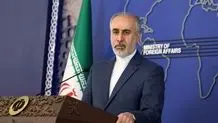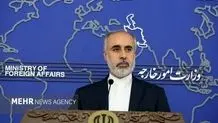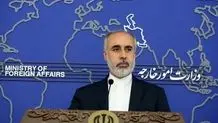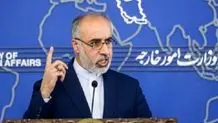Unlike US, Iran has no proxy forces in region: FM Spox.
Unlike the United States, which commands its allies, Iran does not have any proxy forces in the West Asian region, Iran’s Foreign Ministry spokesperson Nasser Kan'ani said.
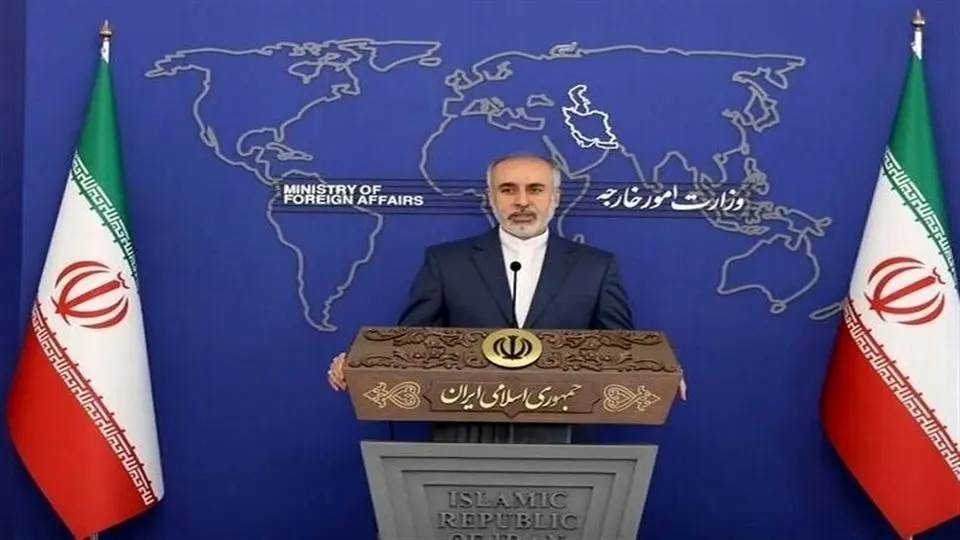
MEHR: Unlike the United States, which commands its allies, Iran does not have any proxy forces in the West Asian region, Iran’s Foreign Ministry spokesperson Nasser Kan'ani said.
Addressing his weekly presser on Monday, Nasser Kan'ani dismissed anti-Iran claims about attacking American positions in the Kurdistan Region.
"The Resistance groups in the region are not under the command of Iran, but they represent their nations and governments," Kan'ani said.
"Resistance groups in Iraq, Syria, and the region make decisions based on the interests of their nations," he said, adding that unlike the United States, which commands its allies, Iran does not have forces under its command or agency.
We have stated many times that the resistance forces in the region are the representatives of their countries and they make decisions based on the interests of their country and nation and act autonomously,” Kanaani said at a press conference in Tehran on Monday.
He called the accusations a type of “projection” of blame used by the Zionist regime to “escape from the dire situation” it has found itself to be caught up in.
“This regime cannot accept that it has been dealt a multi-dimensional defeat from a Palestinian resistance group in Gaza, and therefore, it seeks to accuse this and that, including the Islamic Republic of Iran, in various ways,” the Foreign Ministry spokesman argued.
He said the continuation of the conflicts in the region is the result of the all-round support of US statesmen to the “criminal actions” of the Zionist regime.
“Due to the support of the West and especially the United States [for Israel], we are witnessing the continuous land, sea and air attacks of this regime against the defenseless people of Gaza,” Kanaani added.
Such actions, he went on, provoke the reaction of the resistance groups in the region, who had “warned the US and the Zionist regime many times that if these attacks continue, the resistance groups will not remain silent.”
The spokesman also talked about the issue of cutting political and economic ties with the Israeli regime by Islamic countries. He said that the issue is a key one which has been repeatedly raised by the Islamic Republic, adding that the Palestinian nation rightfully expects the Islamic countries to use all of their capacities. Meetings have been held in that regard, which were not sufficient, he noted.
Islamic countries can take numerous measures in support of people in Gaza, but unfortunately, they are yet to take practical measures to fulfill the Palestinians’ expectations, Kanaani further said.
In response to a question on imports of Israeli-made products in Iran, the spokesman said: “Based on law, the entry of goods produced by Zionist firms or companies that have Zionist shares in some way is banned into Iran where people are not interested in using goods of the Zionist regime.”
But, Kanaani added, the Iranian Foreign Ministry along with other bodies is tasked with assessing the issue that some companies, using unprincipled methods, intend to import Zionist-linked products with or without their names.
He further said that the Foreign Ministry has conducted its assessments in recent years and has provided the Ministry of Industry, Mine and Trade with a list of those goods and the companies under consideration. The Industry Ministry should now make assessments and take required measures, he added, stressing that relevant bodies of the Islamic Republic are aware of their duties and insist on implementing law in this regard.
Regarding the recent visit of the Deputy Minister of Foreign Affairs of Russia to Iran as the rotating head of BRICS, Kanaani said Sergei Ryabkov Deputy Minister of Foreign Affairs of Russia's trip to Tehran was in the framework of developing extensive cooperation between the two countries and of course in the form of cooperation in BRICS.
During this trip, the developments in Gaza were also discussed, he further noted.
Considering that both sides are subject to US sanctions, fighting sanctions was also one of the other issues of concern to Iran and Russia in this conversation, he noted.
Referring to the International Atomic Energy Agency's regarding the amount of Iran's enriched reserves and the Zionist regime's nuclear threat, he said that Iran's peaceful activities are based on cooperation with the IAEA and under the safeguards and NPT framework, and this cooperation continues.
We adhere to the continuation of cooperation with the IAEA, and Iran has never failed to fulfill its responsibilities, and the IAEA also has responsibilities and must fulfill its duties, so the relationship between Iran and the International Atomic Energy Agency will continue.
آخرین اخبار Iran را از طریق این لینک پیگیری کنید.

